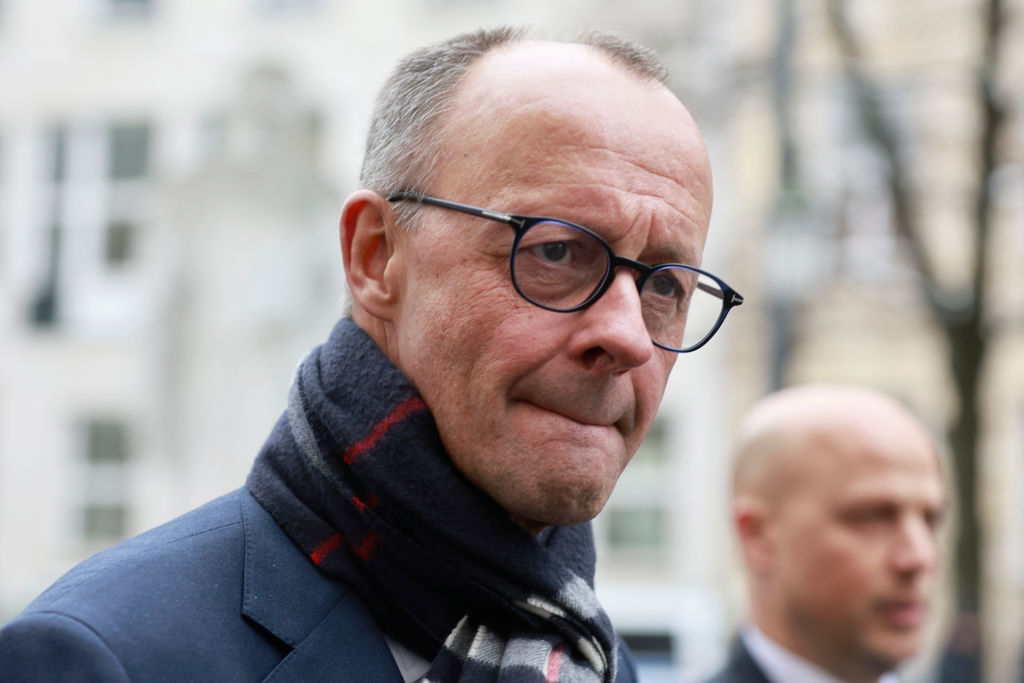Today’s edition is powered by the European Commission
EU Social Forum: Skills for a competitive Europe
How can we equip people with the skills needed to thrive in a rapidly changing economy? Join policymakers, businesses, academics, and civil society to discuss how to tackle the labour and skills gaps to shape a new vision for a competitive Europe.
Europe’s leaders have sounded lately like they are waiting for a mystery hero to stand up to an unruly America and a menacing Russia. Instead, they got Friedrich Merz.
Germany’s likely next chancellor has made it clear he wants to take the driver’s seat on the European stage after the German election, which his Christian Democrats are tipped to win.
Merz complained vocally that the incumbent chancellor, Olaf Scholz, had left it to Emmanuel Macron to convene an emergency European meeting on Monday, after US President Donald Trump had all but sidelined Europe’s leaders from negotiations on the future of Ukraine.
“That is not the role I envisage for Germany,” Merz said.
Merz wants to hold such summits in Berlin and turn Germany from “a sleeping middle power into a leading middle power”.
This includes leading the response to the generational challenge posed by an American president dishing out tariffs and striking deals with authoritarian countries, while Europe musters little more than group photos of its dour-looking leaders at the Elysée Palace.
At the Munich Security Conference last weekend, Merz held court like a chancellor, meeting US vice-president JD Vance, who snubbed both Scholz and China’s foreign minister, Wang Yi.
Can Merz succeed where Europe’s collective approach is currently failing?
At first glance, Merz brings little to the table that qualifies him as a leading hero. He has neither Obama’s swagger nor Macron’s grandiose vision, let alone Angela Merkel’s reputation for integrity and selflessness.
Merz exudes villain vibes.
His appearance has been unfavourably compared to Mr Burns from The Simpsons. Perhaps Gru, the anti-hero from Despicable Me, is a more apt comparison.
Not only do the two share lanky proportions, a love for aeroplanes (Merz is a keen pilot) and a resentment-driven origin story (Gru wants to one-up a fellow villain, who stole a pyramid; Merz is on a quest to settle an ancient score with Angela Merkel, who bested him in a contest to lead the Christian Democrats a generation ago.)
Much like Gru, Merz derives his claim to leadership from the fact that as chancellor of the world’s third-largest economy, he would be a giant in a sea of tiny European minions, who, in isolation, don’t count for much on the world stage.
Like his cartoon counterpart, Merz wants to use this collective strength to confront America. He believes that Europe as a region of 450 million people can cut great deals and bring Trump to heel, if only it can coordinate its positions internally.
His role model is a fellow anti-hero: Jean-Claude Juncker. The chain-smoking former president of the European Commission managed to avert Trump’s tariffs during his first term by promising more imports of American soy and natural gas. Merz envisages a similar deal.
That said, his approach can seem strong on platitudes, foggy on detail, and slightly dated. But Merz speaks the muscular, villainous rhetoric, that dominates the geopolitics of the Trump era – and which the president himself appreciates, as his track record of bonding with strongmen suggests.
Last month, after Merz delivered a keynote speech on his future foreign policy, the event’s host inquisitively asked whether he had ever been to Greenland, which is currently threatened by Trump’s imperial ambitions.
Merz responded: “I flew there myself twice” – an answer just a whisker away from a shirtless Vladimir Putin on horseback.
At the moment, Europe’s choice for leadership is limited. It has no shortage of weakened leaders (Macron), wannabe Trump whisperers without sufficient global clout (Giorgia Meloni), and the sort who will gladly take the easy way out (Keir Starmer).
A headstrong Merz could be Europe’s best shot at standing up to the frosty geopolitical realities.
If Despicable Me has taught us one lesson, it’s that cartoon villains can do good.
[DE,mk]
Roundup
Defence – Top EU diplomat Kaja Kallas warned in an interview with Euractiv that Europe’s discussion over a possible peacekeeping force in Ukraine risks playing into a “Russian trap”.
Environment – Brussels is gearing up to unveil a bold six-step plan to shield heavy industry and stake its claim in clean-tech, according to a draft seen by Euractiv.
Tech – WhatsApp has reported user numbers exceeding 45 million in the EU, the threshold that subjects them to extra reporting requirements under the Digital Services Act (DSA).
Across Europe
Germany – Days before Sunday’s German elections, frontrunner Friedrich Merz has spelled out his plans to restructure the next government, should he lead it.
Also: have a look at our liveblog for the upcoming German election.
France – Limiting property rights on land with installed towers may be unconstitutional and “undoubtedly constitutes an obstacle to fair competition”, the Court of Appeal of Aix-en-Provence said in a decision seen by Euractiv.
Spain – The Spanish government has warned against watering down requirements across multiple EU sustainable reporting rules, as Brussels stands on the cusp of doing so.
Source link : http://www.bing.com/news/apiclick.aspx?ref=FexRss&aid=&tid=67b6457c0d39446da9a6aa7ab0b31d95&url=https%3A%2F%2Fwww.euractiv.com%2Fsection%2Fpolitics%2Fopinion%2Fdespicable-merz-and-europes-minions%2F&c=14617391665958779878&mkt=de-de
Author :
Publish date : 2025-02-18 11:07:00
Copyright for syndicated content belongs to the linked Source.
